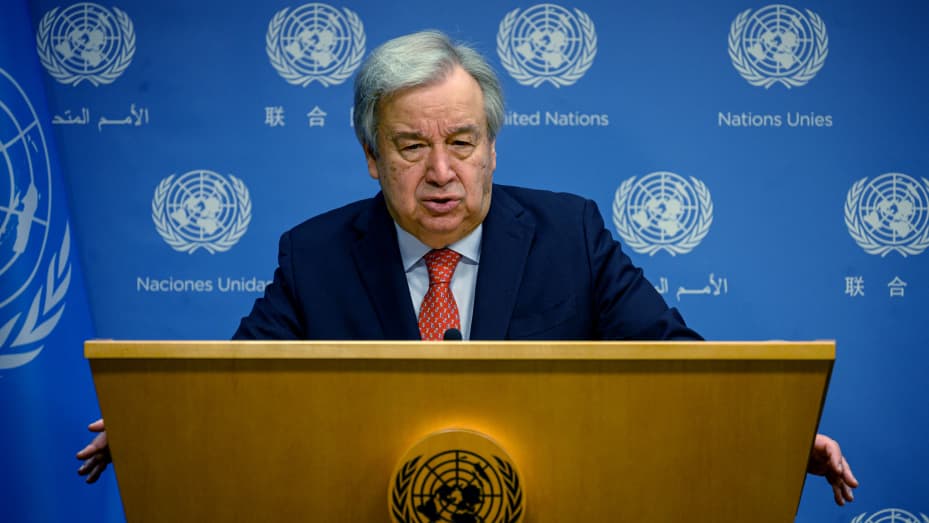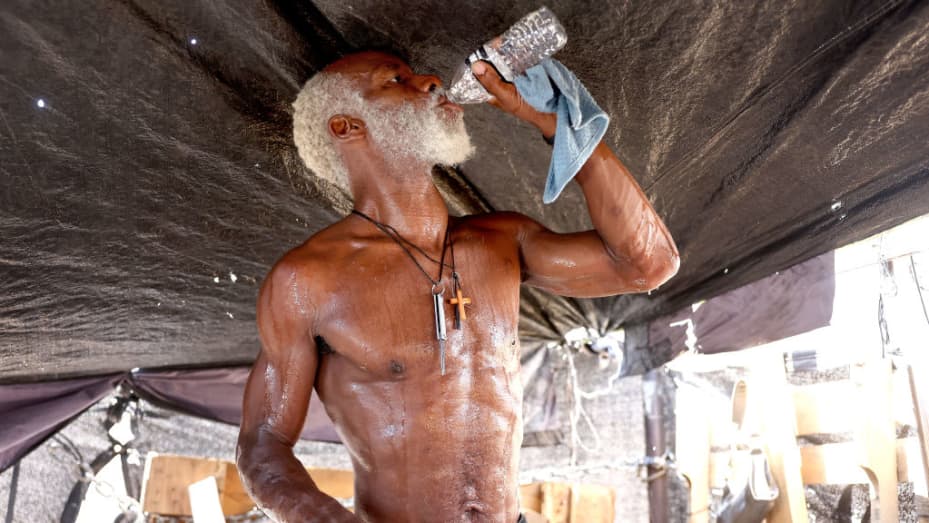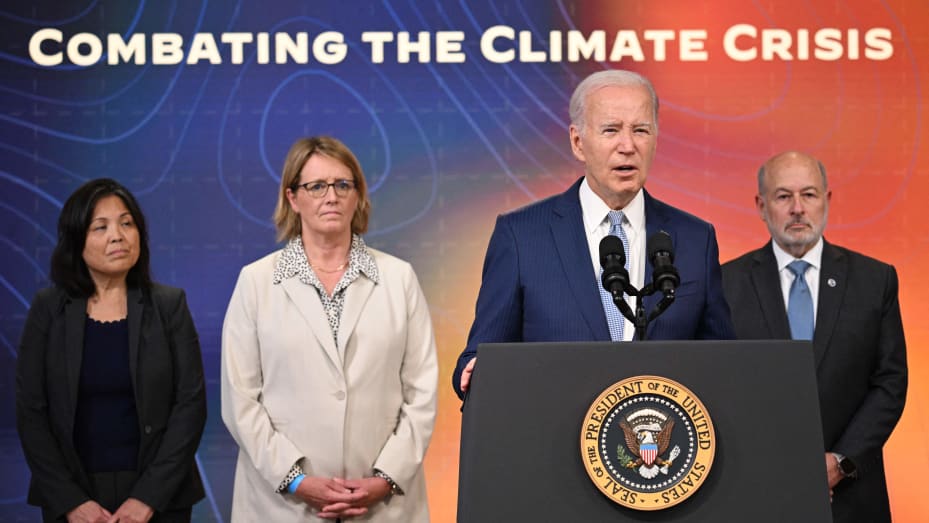
As one construction worker wipes his brow, two other roofers work under a 90 degree temperature at a housing complex under construction in Clarksburg, Maryland on July 26, 2023. Michael S. Williamson | The Washington Post | Getty Images
“The era of global warming has ended; the era of global boiling has arrived.”
So said United Nations Secretary-General António Guterres in a speech Thursday at the UN headquarters in New York City. He focused on new data released from the European Union and the World Meteorological Organization, declaring July is set to be the hottest month on record.
Phoenix has had a brutal summer, and earlier this month, the city broke a 1974 record for the consecutive number of days the temperature has reached over 110 degrees Fahrenheit, according to the National Weather Service.
“For vast parts of North America, Asia, Africa and Europe, it is a cruel summer,” Guterres said. “For the entire planet, it is a disaster.”
The record heat affecting communities across the globe is caused by climate change, and although the phenomenon has long been predicted, the pace of change is devastating, Guterres said.
“For scientists, it is unequivocal — humans are to blame,” Guterres said. “All this is entirely consistent with predictions and repeated warnings. The only surprise is the speed of the change. Climate change is here. It is terrifying, and it is just the beginning.”

US Secretary-General Antonio Guterres speaks about climate change at UN headquarters in New York City on July 27, 2023. Ed Jones | AFP | Getty Images
On Thursday, much of the United States was blanketed in what the National Weather Service called “a dangerous heat wave.” Washington, D.C., Philadelphia, and Boston are under a heat advisory, and the New York City metro area is under an excessive heat warning, according to a Thursday bulletin by the National Weather Service. Numerous high maximum and high minimum temperature records are expected to be broken through Saturday, the National Weather Service said.
Guterres said it is still possible to limit global warming to to 1.5° Celsius above preindustrial levels, as the 2015 Paris Climate Agreement has called for, but “only with dramatic, immediate climate action.”
“We have seen some progress: a robust rollout of renewables, some positive steps from sectors such as shipping,” Guterres said. “But none of this is going far enough or fast enough.”
Greenhouse gas emissions have to be reduced globally and quickly, Guterres emphasized, adding that “fossil fuel companies must chart their move towards clean energy, with detailed transition plans across the entire value chain: No more greenwashing. No more deception.”
In his speech, Guterres also underlined his view that countries must invest in adaptation measures.
“Extreme weather is becoming the new normal,” he said. “All countries must respond and protect their people from the searing heat, fatal floods, storms, drought and raging fires that result.”

Rick White drinks water while cooling down in his tent in a section of the ‘The Zone’, Phoenix’s largest homeless encampment, amid the city’s worst heat wave on record on July 25, 2023 in Phoenix, Arizona. White said, ‘The extreme heat is one thing, but the direct sun, it drains you quick…That sun will have you delirious.’ While Phoenix endures periods of extreme heat every year, today is predicted to mark the 26th straight day of temperatures reaching 110 degrees or higher, a new record amid a long duration heat wave in the Southwest. Extreme heat kills more people than hurricanes, floods and tornadoes combined in an average year in the U.S. Unhoused people are at an especially high risk of heat-related illness or death. Mario Tama | Getty Images News | Getty Images
To address the conditions, the Biden administration asked the Department of Labor to issue a Hazard Alert Thursday to give workers protections from heat under federal law. There have been 436 work-related deaths caused by heat exposure since 2011, per the U.S. Bureau of Labor Statistics, and thousands are hospitalized every year due to heat, according to the White House. The Hazard Alert is aimed at helping employers understand what they should be doing to protect workers from extreme heat and help workers understand their rights.
For help with future preparations, the National Oceanic and Atmospheric Administration will put $7 million from the Inflation Reduction Act to improve weather forecasting.

US President Joe Biden, joined by acting Labor Secretary Julie Su, FEMA Administrator Deanne Criswell, and National Oceanic and Atmospheric Administration (NOAA) Administrator Dr. Rick Spinrad, speaks during a briefing on extreme heat conditions, in the South Court Auditorium of the Eisenhower Executive Office Building, next to the White House, in Washington, DC, on July 27, 2023. Mandel Ngan | Afp | Getty Images
“The need for actionable weather information never ends, and neither do our efforts to make that information as accurate as possible,” NOAA Administrator Rick Spinrad said in a written statement about the funding. “This new consortium funded by President Biden’s Investing in America agenda will help us stay on the cutting edge and help continue innovation needed for more precise forecasts.”
Another heat-related initiative that President Biden announced Thursday is a $152 million investment, also from the IRA, to improve water storage capacity in areas of California, Colorado and Washington that have been particularly affected by drought.
In addition to a rigorous plan to reduce greenhouse gas emission and improve adaptation, Guterres also called for developed countries to live up to commitments to provide $100 billion per year in climate support to developing countries and for the global financial system to be more aggressive in using its power to combat climate change.
“The evidence is everywhere: Humanity has unleashed destruction,” Guterres said. “This must not inspire despair, but action.”






